Discover Anglotopia Podcast | Discussing UK British Travel, History, Culture, London, British Slang, and More!
Anglotopia Podcast | Discussing UK British Travel, History, Culture, London, British Slang, and More!

Anglotopia Podcast | Discussing UK British Travel, History, Culture, London, British Slang, and More!
Author: Anglotopia LLC
Subscribed: 22Played: 117Subscribe
Share
© Copyright Anglotopia LLC
Description
The Anglotopia Podcast is your deep dive into the rich and diverse world of British culture, hosted by Jonathan and Jacqueline Thomas, publishers of Anglotopia.net and Londontopia.net. Each episode takes you on a journey through iconic British television, captivating historical events, and essential travel tips, ensuring you experience the very best of the British Isles. Our engaging discussions feature important British guests and authors, covering everything from the latest trends and timeless traditions to hidden gems and popular landmarks. Whether you're a passionate Anglophile or simply curious about the UK, our podcast offers a delightful mix of insights and entertainment. Join us as we celebrate the charm, heritage, and unique allure of Britain, making every episode a must-listen for anyone who loves all things British.
85 Episodes
Reverse
In this episode of the Anglotopia podcast, host Jonathan Thomas speaks with Billy Cullen, a London taxi driver and history enthusiast, about the unique experience of navigating London's rich history through the lens of the iconic black cab. They discuss the rigorous training known as 'The Knowledge,' the challenges of being a tour guide, and the impact of modern technology like Uber on the traditional taxi industry. Billy shares insights on hidden gems in London, the importance of supporting local businesses, and the evolving landscape of tourism in the city.
Links
Website: londonhistorytaxitours.com
Billy's Black Cab Tour: londonhistorytaxitours.com/book-now/details/372561/billys-black-cab-tour-of-london/
Instagram: @londonhistorytaxitours
Transport for London: tfl.gov.uk/info-for/taxis-and-private-hire/licensing/learn-the-knowledge-of-london
Takeaways
The Knowledge is a rigorous training process for London taxi drivers.
Billy Cullen combines his passion for history with his taxi driving.
London's history spans over 2000 years, offering endless exploration.
The black cab experience provides a personal connection to the city.
Supporting local businesses is crucial for the economy.
Uber has changed the landscape of the taxi industry in London.
Layover tours offer a unique way to experience London in a short time.
Hidden gems like Greenwich are often overlooked by tourists.
Film and TV locations are increasingly popular among visitors.
The future of London's museums is promising with new developments.
Soundbites
"I started thinking about doing the knowledge for freedom, working for myself. Freedom and a cool city." — Billy on why he became a cabbie.
"You have to see the map of London in your head." — Billy on what the Knowledge actually requires.
"They say you can't fail the knowledge, you can only quit." — Billy on the grueling examination process.
"Some driver drove past and shouted out the window, 'Don't bother mate, the game's dead, give it up.' I was furious. After about five minutes, I shrugged it off and carried on my run." — Billy on nearly being discouraged.
"It's a proven fact that the London black cab driver has a significantly larger hippocampus than the average person." — Billy on what the Knowledge does to your brain.
"You'll be on Regent Street and someone will come out in front of you and just start taking loads of pictures and you feel like you're a celebrity." — Billy on driving an iconic black cab.
"99% of the time, people are amazed by the stuff they weren't expecting. It's the secret things that also make up London, not just the stuff you see on pamphlets." — Billy on what surprises American tourists.
"If there's one reason why you should use a black cab rather than Uber, it's because we actually care. Our badge is worth millions of pounds. It's a lifetime of employment." — Billy defending the trade.
"Support local, support the local businesses. Don't pay up to a multi-billion company that has no care for human welfare." — Billy on why to skip Uber in London.
"Know that you can't do everything in one trip. There's people that have lived in London that would need at least 200 lifetimes." — Billy's advice for first-time visitors.
Chapters
00:00 Introduction to London Taxi Culture
02:51 The Knowledge: A Grueling Test for Taxi Drivers
05:40 The Journey to Becoming a Taxi Driver
08:55 The Oral Examination Experience
11:41 Determination and Challenges in the Knowledge
14:33 Life After Passing the Knowledge
17:28 The Iconic London Black Cab
20:14 Memorable Passengers and Celebrity Encounters
23:20 The Cabbie’s Perspective on Opinions
26:29 Transitioning to a Tour Guide
29:13 London History Taxi Tours: Growth and Development
32:07 Advantages of Taxi Tours Over Other Tours
35:11 Film and TV Location Tours
38:08 Airport Layover Tours: A Unique Experience
39:07 American Tourists' Must-See Attractions
40:03 Navigating Misconceptions in British History
45:43 The Impact of Uber on London's Taxi Trade
50:17 Future Plans for London History Taxi Tours
57:29 Exploring London's Historical Tours
01:00:00 Time Travel to London's Past
01:02:56 Advice for First-Time Visitors to London
01:02:57 anglotopia-podcast-outro.mp4
Video Version
In this episode of the Anglotopia podcast, host Jonathan Thomas speaks with Dan Absher, a lifelong Beatles fan and CEO, about the cultural impact of the Beatles and the insights he has drawn from their success for his upcoming book, 'The Fab Four Pillars of Impact: Building Dynamic Teams the Beatles' Way.' They discuss Dan's early memories of the Beatles, his experiences in Liverpool, and the lessons that modern businesses can learn from the Beatles' journey, including the importance of unity, vision, and adaptability.
Links
Dan's book — The Fab Four Pillars of Impact: Building Dynamic Teams the Beatles Way (Greenleaf Book Group Press, February 2026)
fab4academy.com — Dan's website
The Beatles on Ed Sullivan, February 9, 1964
Cliveden (National Trust)
Strawberry Fields Forever
Friends of Anglotopia Club
Takeaways
Dan Absher's lifelong passion for the Beatles began at age five.
The Beatles' charisma and humor were key to their early success.
Ringo's role was essential as the steady drummer of the group.
Family traditions often incorporate Beatles music, especially at milestone birthdays.
Cliveden, where the Beatles filmed, was a significant experience for Dan.
Liverpool has transformed into a vibrant city with a Beatles economy.
Freda Kelly provided unique insights into the Beatles' personalities.
The Beatles' success was driven by the right people and a catalytic vision.
Internal conflicts and differing visions contributed to the Beatles' breakup.
The Beatles' legacy continues to influence modern business practices.
Soundbites
Here are 10 interesting soundbites from the episode:
"It wasn't until much later that I started to realize how great of musicians they were too. Right then it was their charisma, their personalities, their humor." — Dan on watching the Ed Sullivan show at age five.
"I might have been coerced into picking Ringo because they needed a drummer and not another guitar player. But I fully embraced the Ringo role." — Dan on childhood Beatles roleplay with his brother and cousin.
"Every occasion I can think of, particularly in my life, a Beatles song gets played a lot at family outings." — Dan on how the Beatles are woven into his family traditions.
"John's vision was to save the world. George's was to save his soul and be close to God. Paul wanted to remain relevant in music his whole life. And Ringo — his vision was, have fun with my buddies." — Dan on how their diverging visions fractured the band.
"It sounds absurd to think of the four of them having a strategic planning retreat, but that's what they needed." — Dan on what could have saved the Beatles.
"Paul was clinging so hard to try to keep them together. I think that clinging itself had a way of pushing them further apart." — Dan on Paul's role in the breakup.
"No one I think is in my tree. He's talking about feeling different and isolated, maybe special." — Dan breaking down why Strawberry Fields Forever is his favorite Beatles song.
"The big fight was over who was going to manage the Beatles — Alan Klein or Paul's in-laws. They were all wrong." — Dan on the business conflict that tore them apart.
"Each of the four of them had a vote and each of the four of them had veto power of anything they wanted to do." — Dan on how Apple Corps eventually structured their business.
"It made me realize life's short. Most people back at the company, they got it handled. They can do it without me." — Dan on how dying on the operating table inspired him to finally write the book.
Chapters
00:00 Introduction to the Beatles' Impact
01:49 Dan's Beatles Origin Story
04:33 Teenage Years and Family Traditions
07:27 Study Abroad at Clifton Estate
09:25 Visiting Liverpool: A Beatles Pilgrimage
11:20 An Evening with Freda Kelly
14:06 Abbey Road Experience
15:17 The Fab Four Pillars of Impact
19:09 The Formation of The Beatles
21:52 The Role of Vision and Competition
23:25 Camaraderie and Emotional Bonds
27:57 Synergy and Serendipity in Creativity
31:25 Understanding the Breakup
36:03 The Aftermath and Corporate Dynamics
42:34 Lessons for Modern Businesses
49:09 anglotopia-podcast-outro.mp4
Video Version
In this episode of the Anglotopia podcast, host Jonathan Thomas discusses exciting plans for 2026, including his personal goal of walking Hadrian's Wall, the revival of Anglotopia's online store, and major cultural events happening across Britain. He highlights significant Royal anniversaries, exhibitions, and theatre performances to look forward to, emphasizing the importance of planning ahead for Anglophiles. The episode concludes with a call to support Anglotopia through the Friends of Anglotopia Club.
Links
Friends of Anglotopia
Cornish Smuggler's Tea
Anglotopia Store
Macs Adventure
Shadowlands with Huge Bonneville
Sorry, Prime Minister Tickets
The Unlikely Pilgrimage of Harold Fry
Takeaways
Walking Hadrian's Wall is a personal goal for Jonathan.
Anglotopia is reviving its online store after ceasing imports.
2026 marks Queen Elizabeth II's 100th birthday with special events.
The Bayeux Tapestry will be exhibited at the British Museum.
Celebrations for Beatrix Potter and other British icons are planned.
New museums, including V&A East, will open in 2026.
Winston Churchill's paintings will be featured in an exhibition.
Theatre performances in London's West End are highly anticipated.
Planning ahead is crucial for Anglophiles traveling to Britain.
Joining the Friends of Anglotopia Club supports British culture.
Sound Bites
1. The Big Commitment (Line 38)
"So we closed this deal about a month or two ago and that's a big deal because now I have to do it. There's people counting on me to do this. Macs Adventure is counting on me doing it, my business is counting on me to do it, so I have to do it. I don't have a choice."
2. The Challenge Ahead (Line 14)
"It involves physically preparing to walk 84 miles on purpose. And I, as you can see, I'm not in the best of shape. So the idea of walking so many miles is kind of daunting to me."
3. You're All Coming Along (Line 44)
"That's the big thing for Anglotopia in 26 is I'm walking Hadrian's Wall. I don't have a choice and you're all coming along for the ride with me."
4. Personal Health Stakes (Lines 26-28)
"It's for my own health. I'm not in great health. Preparing training for the walk will improve my health and having done it will also improve my health, and I'm hoping that it kind of ushers in a new era where hopefully once a year I do one of these famous long distance walks in Britain."
5. The Bayeux Tapestry Coup (Lines 105-106)
"I don't know how they got the French to agree to this. Apparently it took years of negotiations, but the Bayeux Tapestry is gonna leave France and come to the British Museum for a special exhibition. One hopes they give it back when they're done."
6. Queen Elizabeth 100 (Lines 80-82)
"April would have been Queen Elizabeth II's 100th birthday. And so we're expecting a lot of commemorations around that… It'll be a chance for people to kind of reflect and remember the lovely days of the reign of Elizabeth II."
7. The London Museum Opening (Lines 166-168)
"It might almost be worth making a special trip for—not just because I like London's history, but it's to see the building itself. The Smithfield Market is an architectural jewel of London."
8. Churchill's Painting Secret (Lines 185-186)
"He famously used it to help cope with his mental health, because when he was having the most troubles, he would just go paint, and he would find solace in painting."
9. Television Turns 100 (Line 112)
"Many people don't know that a Brit actually made invented television. And so January 26, 2026 will mark the 100th anniversary of Brit John Logie Baird's first public demonstration of television in London."
10. Yes Prime Minister Passion (Lines 220-222)
"Yes Minister and Yes Prime Minister are my favorite British comedy show of all time. I've watched it a dozen times over and over. It is so funny… I desperately wanted to see this on the West End."
Chapters
00:00 Angotopia's Plans for 2026
10:08 Major Events in Britain for 2026
16:39 Cultural Celebrations and Anniversaries
26:48 Looking Ahead: Future Events and Exhibitions
27:43 Upcoming Exhibitions Worth Seeing
29:45 Exciting Museum Openings in 2026
32:11 Major Exhibitions to Look Forward To
35:15 Theatrical Highlights in the West End
48:30 Top Picks for 2026
50:23 anglotopia-podcast-outro.mp4
Video Version
In this engaging Christmas episode of the Anglotopia podcast, host Jonathan Thomas and guest and Anglotopia columnist Amanda Graves explore the fascinating differences between British and American Christmas traditions. Amanda shares her experiences of celebrating Christmas in both cultures, discussing everything from the timing of decorations and Christmas dinner to the significance of Boxing Day and the King's speech. The conversation highlights the unique aspects of each tradition, the challenges of blending cultures, and the joy of preserving cherished customs while adapting to new ones.
Links
Spilling the Tea Column on Anglotopia
British Christmas Articles
Friends of Anglotopia
Takeaways
Amanda shares her first culture shock during her first American Christmas.
The tradition of opening presents on Christmas Day is a significant difference between the UK and the US.
Christmas dinner in the UK typically includes turkey, stuffing, and Christmas pudding, while Americans often opt for ham or beef.
Amanda has adapted to American traditions while still trying to maintain some British customs.
Christmas crackers are a fun British tradition that Amanda tries to introduce to her American friends.
The misconception of fruitcake in America differs greatly from the British version, which is often enjoyed.
Boxing Day is a day of recuperation and charity in the UK, but is largely unknown in America.
The King's Christmas speech is an important tradition for Amanda, providing a moment of reflection during the holiday.
Christmas television specials are a cherished part of British culture that Amanda misses.
Amanda enjoys the festive spirit of Texas, where Christmas decorations are often extravagant.
Sounds Bites
Here are 10 compelling sound bites from the episode with timestamps:
1. The Decoration Culture Shock (02:22-02:51)
"Suddenly everybody had tons of decorations up. Everybody had wreaths on their door. Everybody was putting lights into their bushes outside their door. And I'm thinking, I didn't know that we were supposed to do that."
2. Tree Timeline Shock (02:51-03:18)
"A lot of people put their Christmas trees up super early, right after Thanksgiving. That was a bit baffling to me because at home we really didn't put up our Christmas tree until the week of Christmas."
3. The Cactus Christmas (04:12-05:02)
"When I first met my husband, he had a large cactus and he would put some really funny ornaments on the cactus. He has some funny ornaments like the Oscar Mayer Wienermobile, which hangs from that. We still have a small Christmas tree that we put the tacky ornaments on as a nod to his previous indifference of Christmas."
4. The Breakfast in Bed Disaster (06:48-07:37)
"We decided to make my mother breakfast in bed. We had no way of knowing that very late the night before she'd gone to midnight mass and had trod dog poo all the way up the stairs and had to spend two hours scrubbing the stairs, had fallen into bed at about three o'clock in the morning and we woke her at six o'clock with breakfast in bed."
5. Bilingual Christmas Greetings (01:32-01:38)
"Well, I am bilingual now. So when I'm here, I say Merry Christmas. And when I'm in England, I say Happy Christmas."
6. Christmas in July Surprise (41:45-42:29)
"I enlisted my niece to help me surprise everybody with Christmas in July. I had ordered a turkey from the butcher and it was so big it literally wouldn't fit in the fridge. So I had to find a cooler, pack it full of ice and put the turkey in the cooler and hide it."
7. The Queen's Speech Tradition (06:48-07:37)
"At three o'clock, it was the Queen's speech, it's now the King's speech, and that is an absolute must-see. Everybody pretty much gathers around the TV. We would spend hours before Christmas poring over the radio times and the TV times to see what was on on Christmas Day."
8. Not Grandma Got Run Over by a Reindeer (43:11-43:22)
"I like to tune into the Christmas carols and just remind myself that there are beautiful carols out there and beautifully sung and it's not Grandma Got Run Over by a Reindeer."
9. American Vacation Reality (42:01-42:29)
"In the UK, pretty much everybody has that whole week off. It's just expected. That's another thing. It's more difficult to do that, to get away, unless the children are really small."
10. The Great Christmas Closing Line (46:46-46:52)
"Whether you're celebrating with Christmas crackers or inflatable lawn Santas, mince pies, or fruit cake, we wish you a very happy Christmas. Or is it Merry Christmas? After this conversation, we'll leave that choice up to you."
Chapters
00:00 Introduction to Christmas Traditions
02:29 Amanda's First American Christmas Experience
05:19 Childhood Christmas Traditions in Britain
08:22 Navigating British Traditions in America
11:04 Christmas Dinner: A Cultural Comparison
14:21 The Role of Christmas Crackers
16:59 Understanding Fruitcake: A Misconception
20:06 Present Opening Traditions
23:10 Cultural Differences: Massachusetts vs. Texas
24:43 Christmas Traditions: A Cultural Contrast
31:03 Understanding Boxing Day: A British Perspective
35:48 The Importance of Christmas Carols and Services
39:37 American Christmas Traditions: Embracing New Customs
41:34 Nostalgia and Family: Celebrating Christmas Across the Pond
Video Version
In this episode of the Anglotopia Podcast, host Jonathan Thomas and British TV expert Tom Salinsky delve into the rich tradition of British Christmas television specials. They explore the cultural significance of these specials, the evolution of Christmas Day TV schedules, and highlight some of the most beloved and memorable Christmas episodes from shows like Wallace & Gromit, Doctor Who, Only Fools and Horses, and Gavin and Stacey. The conversation also touches on the nostalgia associated with classics like The Snowman and the impact of streaming on traditional viewing habits. Salinsky shares insights into the history of Morecambe and Wise, the role of sports in Christmas TV, and the unique approach of shows like EastEnders during the festive season. The episode concludes with a discussion on the importance of the Radio Times Christmas double issue and a promotion for Salinsky's new podcast, All British Comedy.
Links
AllBritishComedy.com
Tom Salinsky
Tom Salinsky's Red Dwarf books
Radio Times Christmas Double Issue
BBC Genome Project
The Snowman
Friends of Anglotopia Club
Takeaways
British Christmas television specials are a cultural institution.
Christmas specials often feature nostalgia and beloved characters.
The Snowman is a quintessential part of British Christmas.
Only Fools and Horses Christmas specials are highly anticipated events.
Gavin and Stacey's serialization contributed to its popularity.
Christmas Day TV schedules have evolved over the years.
The Radio Times Christmas double issue is a cherished tradition.
Not all Christmas specials are successful or well-received.
EastEnders often delivers dramatic and intense Christmas episodes.
Streaming has changed how audiences engage with Christmas specials.
Sound Bites
1. On why British Christmas TV became a tradition: "I think it was EastEnders that made the difference. In 1986, EastEnders devoted its Christmas episode to the Den and Angie storyline absolutely coming to boiling point... The viewing figures were phenomenal—something like 30 million. Half the population was watching." — Tom Salinsky
2. On the unique appeal of Christmas specials: "The difference between writing a regular episode of Doctor Who and a Christmas special is there will be non-fans watching at Christmas. The 14-year-old says, everybody has to shut up so I can watch this. And then uncle and auntie and grandma and grandpa are all in the room anyway." — Tom Salinsky
3. On nostalgia and Christmas television: "Nostalgia and Christmas, certainly for British television, seem very intertwined. It's a time when we want to hark back to the past... Even Vengeance Most Foul, which is a brand new piece of work, feels old-fashioned, has that old-fashioned charm about it." — Tom Salinsky
4. On why EastEnders goes dark at Christmas: "If what we tune in for is misery and torment and betrayal, then at Christmas it needs to be maximum misery and maximum betrayal. No one is starved of EastEnders. So when it comes around for Christmas, we just want to take that lever and throw it as far in the direction of drama as we possibly can." — Tom Salinsky
5. On the Radio Times Christmas double issue: "When I was 10, I would have read about National Velvet and that Old Curiosity Shop musical film in the Radio Times and probably opted not to circle them. We were a very middle-class household, Jonathan, so we didn't get the TV Times because that was vulgar." — Tom Salinsky
6. On discovering The Snowman: "I spent Christmas in England in 2013 and I kept hearing this haunting melody everywhere... I finally saw it and I was literally in tears when it was over. I'd never seen it before, but it just hit me. There's no words—even the book has no words—and it's an incredible story." — Jonathan Thomas
7. On the 1971 Morecambe and Wise Christmas special: "The 71 special with Andre Previn is definitely something a cut above. That is such a famous routine. They kind of stayed at the top of their game for about seven or eight years, which is hard to do." — Tom Salinsky
8. On The Office Christmas specials: "The way that The Office started out as this show which nobody really knew what it was or why it was funny... to then capturing the nation's conversation and ending up being the centerpiece of the BBC One Christmas schedule in three years is astonishing." — Tom Salinsky
9. On the first Doctor Who Christmas special: "Nobody knew whether that first series with Christopher Eccleston was going to be a success. We'd never had a Doctor Who Christmas special before. Just as Russell T. Davies had to invent how to make Doctor Who at all in 2005, he had to invent a Doctor Who Christmas special." — Tom Salinsky
10. On Christmas specials as the last appointment viewing: "We're just now used to using our television sets as jukeboxes where we select what we're going to watch. We're out of the habit of treating them like radio sets where the broadcaster determines what we are sent at what time... I think it's one of the nice things about Christmas that we just get a little bit of that communal viewing experience back again." — Tom Salinsky
Chapters
00:00 Introduction to Christmas Television Specials
04:03 The Cultural Significance of British Christmas TV
09:59 Traditional British Christmas Day TV Schedule
13:22 Top British Christmas Specials
20:07 The Evolution of Doctor Who Christmas Specials
25:52 The Legacy of Morecambe and Wise
30:44 The Timeless Charm of The Snowman
33:21 Only Fools and Horses: Christmas Specials
35:18 The Enduring Appeal of Call the Midwife
36:41 Christmas Specials: A Tradition in British Sitcoms
39:01 Gavin and Stacey: The Power of Serialization
41:53 Sporting Events and Christmas TV
42:41 Christmas Specials That Missed the Mark
45:39 EastEnders: Maximum Drama at Christmas
48:17 The Future of Christmas Specials in Streaming Era
49:31 The Radio Times: A Christmas Tradition
54:20 anglotopia-podcast-outro.mp4
Video Version
In this episode of the Anglotopia Podcast sponsored by Jolly Posh Foods, host Jonathan Thomas speaks with Lucy Pask, a British expat in Chicago, about the significance of British food during Christmas. They discuss the offerings of Jolly Posh Foods, Lucy's journey from the UK to the US, and the unique aspects of British Christmas dinner traditions, including the importance of specific dishes and the cultural nuances that come with being an expat. The conversation also touches on Boxing Day traditions and the challenges of finding authentic British food in America.
Links
Jolly Posh Foods
British American Business Council Chicago
Friends of Anglotopia Club
Takeaways
British food is a significant comfort for expats during the holidays.
Jolly Posh Foods provides authentic British food to expats in America.
Lucy Pask's journey reflects the passion for British culture in the US.
Christmas dinner in Britain includes unique dishes like pigs in blankets and roast potatoes.
Boxing Day is a day for leftovers and family traditions.
The importance of Yorkshire pudding in British cuisine cannot be overstated.
Mince pies are a staple of British Christmas, despite their acquired taste.
Ordering British food early is crucial for expats during the holiday season.
Cultural differences in food can lead to humorous misunderstandings.
The joy of sharing British food traditions with American family members.
Sound Bites
"The correct answer is always to say my family. But the honest answer, Jonathan, is that I really miss Waitrose and Marks and Spencer."
"When you're in the UK, the whole of the UK, not just England, you're never more than about six foot away from a bacon butty."
"When you have a proper breakfast sausage in the UK for the first time, it's almost like a revelation. You're like, I've been doing sausage wrong my whole life."
"Being able to access this food and share it with them is one of my greatest joys in life."
"I honestly don't think I could eat a Christmas dinner if I wasn't wearing a paper crown. I've never tried it and I don't want to."
"Over 750 million pigs in blankets are eaten in the UK during Christmas... every citizen eats 13 pigs in blankets on Christmas Day."
"We thought, well, what can we take to Thanksgiving? Why don't we take a Christmas pudding? We'll set fire to it and it'll make them laugh. And now we have to do it every year."
"There's something about Chicago and a Midwestern attitude that's actually very British. It's a little self-effacing, fun, open to being humble and funny about yourselves."
"It is treated with the same reverence and panic as booking Coachella tickets or Eras Tour tickets."
"Full disclosure, I messed the whole thing up... Christmas Eve in the UK is one of the biggest nights out of the year. It is a full-on festival of going out to the pub. All the pubs and bars were shut at 10."
Chapters
00:00 Introduction to British Christmas Food
04:11 Lucy Pask's Journey to Chicago
19:58 Exploring British Christmas Dinner Traditions
25:54 The Quintessential British Christmas Dinner
34:54 Christmas Pudding and Its Traditions
38:25 Understanding Mince Pies
50:17 Boxing Day: The Day of Leftovers
54:56 Ordering British Foods for the Holidays
58:59 anglotopia-podcast-outro.mp4
Video Version
In this episode, historian Dr. Chris Smith discusses the Coventry Blitz, marking its 85th anniversary. He explores the myths surrounding the event, particularly the narrative that Churchill sacrificed Coventry to protect intelligence secrets. The conversation delves into the scale of the bombing, the city's industrial significance, the immediate aftermath, and the role of propaganda. Smith also highlights the reconstruction efforts and the lasting legacy of the Blitz in Coventry's identity, emphasizing themes of resilience and reconciliation.
Note: I'm aware of the technical problems with the guest's video - unfortunately, there is no way to fix it, but the audio is fine. Also, there will not be a podcast next week due to the Thanksgiving holiday.
Links
Chris Smith at Coventry University
"The Last Cambridge Spy: John Cairncross, Bletchley Codebreaker and Soviet Double Agent" by Chris Smith
Official Coventry Cathedral website: coventrycathedral.org.uk
Hitler's Btlitz's on Britain (Article)
Friends of Anglotopia Club
Takeaways
The Coventry Blitz is framed by both historical and modern narratives.
Myths surrounding the Blitz, particularly about Churchill, persist despite being debunked.
The bombing raid on Coventry was one of the largest of the war at that time.
Coventry's industrial significance made it a strategic target during WWII.
The aftermath of the bombing revealed a complex public reaction, not just unity.
Propaganda played a crucial role in shaping public perception of the Blitz.
The reconstruction of Coventry was influenced by pre-war modernization plans.
The new cathedral symbolizes peace and reconciliation after the war.
Coventry's identity is deeply tied to the events of the Blitz.
Commemoration of the Blitz remains significant in Coventry's cultural memory.
Soundbites
Here are 10 interesting soundbites from the Coventry Blitz podcast:
On the scale of the raid: "They dropped something in the region of 30,000 incendiary bombs, 500 tons of high explosives and 50 landmines. They even used some brand new types of explosive that they hadn't really been using to that point. It's a really, really massive raid by the standards of the war to that point."
On the Churchill Ultra myth: "There's no evidence that Churchill made a decision to sacrifice Coventry. It's an absolute fantasy which basically has to rely upon either Churchill being the most evil man who has ever existed or the most incompetent man who has ever existed."
On strategic bombing's true purpose: "One of the points of strategic bombing is terror, is to cause terror amongst the citizens... the British actually have a really nasty euphemism for this, which was to 'dehouse people' as a result of bombing. And that's how they basically described killing citizens and making other citizens homeless."
On Coventry's industrial importance: "Coventry is hugely important industrially to Britain's war effort... by the time we get into the 20th century, bicycle manufacturing, the auto industry, the car industry becomes very important to Coventry, which makes it both wealthy and a ripe target."
On the cathedral's symbolism: "They didn't knock it down. They built a new cathedral right next to it. So if any of your listeners ever visit Coventry, you can actually walk around the ruins of the old cathedral... It's a really powerful testament to resilience."
On why the myth persists: "The myth of Churchill sacrificing Coventry persists because it plays into this very British, post-war self-image of stoic heroism and difficult choices. It makes for a better story than the truth, which is that sometimes intelligence fails and terrible things happen."
On comparing bombing campaigns: "In Dresden, over 22,000 people are killed. The US conventional bombing of Tokyo kills over 100,000 people. So by those standards, what we're talking about in Coventry is relatively light, but by the context of what's happening in Britain, it's extremely serious."
On "Keep Calm and Carry On": "These posters were wildly unpopular. They're really patronizing. They never really get used in the Second World War—they mostly just stay in a warehouse and are pulped for paper. But now they've taken on this massive life... You cannot go to London without seeing them, but you wouldn't have seen that in the Second World War at all."
On Coventry's transformation: "Coventry becomes a symbol of reconciliation and peace after the war, forging connections with other bombed cities including Dresden. It's this remarkable transformation from devastation to representing hope and international cooperation."
On the raid's duration: "The raid begins around seven o'clock in the evening, 10 past seven, and it lasts for a good 11 hours. The all-clear isn't actually announced until 6:16 the following morning. Eleven hours of continuous bombing—imagine living through that."
Chapters
00:00 The Coventry Blitz: A Historical Overview
01:48 The Scale and Impact of the Raid
04:48 Destruction and Loss: Key Buildings in Coventry
06:29 Strategic Bombing: Aiming for Terror and Industry
07:20 Why Coventry? The Target's Significance
13:51 Civilian Response: How Coventry Endured the Blitz
15:04 The Myth of Foreknowledge: Churchill and Ultra Intelligence
23:29 Debunking the Sacrifice Myth: Historical Clarifications
27:20 Complex Narratives: Understanding WWII's Intricacies
28:04 The Aftermath of the Coventry Blitz
35:04 National Reactions and Morale
39:04 Reconstruction Plans for Coventry
41:13 Symbolism of the Cathedral Ruins
46:12 Lessons from the Blitz and Modern Warfare
49:07 The Enduring Legacy of the Blitz
50:08 Commemorating the Coventry Blitz
52:52 Exploring the Coventry Blitz and Its Myths
55:28 The Propaganda of War: Debunking 'Keep Calm and Carry On'
58:41 Books and Future Projects: Insights from Chris Smith
01:00:37 anglotopia-podcast-outro.mp4
Video Version
In this episode of the Anglotopia podcast, Jonathan Thomas takes listeners on a journey through significant locations in Britain associated with Sir Winston Churchill. The discussion begins with key sites in London, including the Houses of Parliament, Downing Street, and the Cabinet War Rooms, highlighting their importance in Churchill's life and career. The conversation then shifts to notable places outside of London, such as Blenheim Palace and Chartwell, which were pivotal in shaping Churchill's identity. The episode concludes with a look at international connections to Churchill's legacy, including museums and archives in the United States.
Links
Houses of Parliament Tours - Palace of Westminster official tour booking page
Churchill War Rooms - Imperial War Museums official site
10 Downing Street - UK Government page (note: not open to the public)
Chartwell National Trust
Blenheim Palace Official Website
Harrow School
Royal MIlitary Academy Sandhurst
Churchill Archives Cambridge
National Churchill Museum Fulton, Missouri
International Churchill Society
Wallace Collection Churchill Paintings Exhibition (2026)
Tim Riley Churchill Podcast
Churchill Archive Podcast
Takeaways
Churchill's connection to London was profound and influential.
The Houses of Parliament served as a key location for Churchill's political career.
Chartwell was not just a home but a source of inspiration for Churchill.
Blenheim Palace is significant as Churchill's birthplace and family heritage site.
The Cabinet War Rooms provide insight into Churchill's leadership during WWII.
Churchill's speeches were often first delivered in the House of Commons.
The Churchill Archives at Cambridge is a valuable resource for research.
Churchill's legacy extends beyond the UK, with significant sites in the US.
The Wallace Collection will host a major exhibition of Churchill's paintings in 2026.
Visiting Churchill-related sites offers a deeper understanding of his impact on history.
Sound Bites
"If he had a single place of work that was most important to him, it would be the Houses of Parliament and the Palace of Westminster."
"He genuinely had a great love and affection for the Houses of Parliament. He thought they were beautiful. He thought they were the heart of the empire. He thought that it was an immense privilege to work there."
"Many people don't know that when you hear recordings of Churchill's speeches, most of those were actually recorded after the war."
"He famously said that a day away from Chartwell is a day wasted."
"To him, the manor house represented the England that he loved the most."
"Chartwell is not a grand house. It's not like Blenheim Palace. Blenheim Palace is a palace. Chartwell is a family home."
"He produced much of his literary output that he would eventually win the Nobel Prize for literature for."
"I should do a whole podcast on Young Churchill because some of the stuff that he did is wild."
"We're going to guide you through the places, why they're important to Churchill, and then give you some visiting tips in case you would like to visit."
"It's where he wrote, it's where he painted, it's where he had his family life and raised his children in the later years."
Chapters
00:00 Exploring Churchill's Britain
20:01 Churchill's Legacy Beyond London
32:52 anglotopia-podcast-outro.mp4
Video Version
In this episode of the Anglotopia podcast, host Jonathan Thomas speaks with art historian and broadcaster James Fox about his new book 'Craftland: In Search of Lost Arts and Disappearing Trades.' They explore the significance of traditional crafts in British culture, the impact of geography on craftsmanship, and the challenges faced by artisans in a modern, digital age. The conversation highlights the importance of preserving these skills and the cultural heritage they represent, as well as the potential for a craft revival in contemporary society.
Links
Craftland (Amazon Link)
Craftland (Bookshop.org link)
James Fox Website
Heritage Crafts Association
Friends of Anglotopia Club
Takeaways
Craftsmanship is a profound part of our identity.
We are a species of makers, connected to our craft heritage.
The art of making still matters in our digital age.
Geography significantly influences the types of crafts practiced.
Craftspeople are often the last custodians of their trades.
The decline of traditional crafts reflects a broader economic shift.
Craftsmanship can teach us about patience and value in a fast-paced world.
There is a growing interest in crafts post-COVID-19.
Apprenticeships are crucial for sustaining traditional crafts.
Crafts can reveal much about local and national identity.
Sound Bites
1. On the crisis facing British crafts: "Of all of our traditional crafts, about half of them are endangered, about quarter of them are critically endangered. And in the last 10 years or so, five crafts have gone extinct in Britain."
2. On the cricket ball revelation: "I read in the newspaper that the art of cricket ball making had gone extinct. And I thought this was completely outrageous for a country that invented the game of cricket, which I'm sure you know, Jonathan, is the greatest sport in the world, that we weren't even making cricket balls anymore."
3. On breaking down art vs. craft distinctions: "These distinctions are completely false. You know, there is for me one great spectrum of making that exists for human beings... craftspeople... are just as culturally important as our famous artists and actors and composers that have generally got much more credit."
4. On the 10,000 hours principle: "All the people I know who are successful are successful because they work hard and they do not give up and they've dedicated to themselves to doing something and to doing it right."
5. On learning a craft the hard way: "I thought it would be very easy actually dry stone walling... as soon as I started doing it I realized it is far more difficult than you think... I embarrass myself greatly."
6. On what other countries do better: "If you are a top crafts person in Japan or South Korea or even in France, you can be called a living national treasure where the state actually pays you to promote your craft and to pass it on. We do not have such a scheme in the UK."
7. On the apprenticeship crisis: "The biggest problem is apprenticeships. There's woefully little support for apprenticeships in the UK... if the UK really wants to make a difference to craft and to make it more viable, it needs to invest more significantly in its apprenticeship schemes."
8. On hidden heritage in unexpected places: "Wherever you come from, whether it's Bedfordshire in England or it's Indiana in the United States, there is a craft history, a manufacturing history to uncover... you will find creativity, you will find something interesting happen."
9. On craft as universal: "I think it's something that is just common to humanity, but unfortunately not as common as it used to be."
10. On the motivation behind the book: "This is the moment to travel around the country and to document these crafts before they disappear... It was just the most enjoyable and wonderful thing to do. It was the highlight of my professional career."Retry
Chapters
00:00 Introduction to Craftland and Its Importance
02:50 The Journey of Discovery: Craft Revival in Britain
05:35 The Art of Craft vs. Art: A Cultural Perspective
08:37 Surprising Crafts: The Intricacies of Bell-Founding
11:47 Bells: A Cultural Heritage and Their Significance
14:36 Craftland: A Reflection of Britain's National Identity
17:24 Regional Crafts: The Lost Industries of Britain
20:23 The Decline of Manufacturing: A Global Perspective
23:19 Cultural Identity: The Legacy of Craft Surnames
26:22 The Future of Craft: A Personal Connection
26:31 Custodians of Craftsmanship
29:03 Craftsmanship in the Age of AI
35:12 Geography's Influence on Craft
38:59 The Role of Royalty in Craft Preservation
45:36 Lessons from Craft Masters
51:16 The Future of Traditional Crafts
56:22 anglotopia-podcast-outro.mp4
Video Version
In this episode of the Anglotopia podcast, Jonathan Thomas discusses how to travel around Britain on a budget of $100 a day. He shares practical tips on accommodation, transportation, attractions, and dining, emphasizing the importance of planning and making use of available resources to save money. The conversation covers various strategies for budget travel, including the use of budget chain hotels, public transportation, and free attractions, while also providing insights into dining options and money-saving tips.
Links
VisitBritain.com – official UK tourism website with deals, itineraries, and regional guides.
BritRail Pass – britrail.net for rail pass information and booking.
National Rail Enquiries – nationalrail.co.uk for live train times and prices.
National Trust – nationaltrust.org.uk for passes, properties, and cream tea stops.
Trainline - App for booking UK train tickets
English Heritage – english-heritage.org.uk for castle and ruin visits. Click here for Overseas Visitors Passes.
Royal Oak Foundation (US) – royal-oak.org for discounted entry to National Trust sites for Americans.
Premier Inn – premierinn.com
Travelodge UK – travelodge.co.uk
YHA Hostels – yha.org.uk for affordable and scenic stays.
Friends of Anglotopia Club
Takeaways
Traveling around Britain on a budget is achievable with careful planning.
Accommodation is often the largest expense; budget chain hotels can save money.
Public transportation is affordable and efficient for getting around Britain.
Many attractions, especially museums, are free to enter.
Using a Britrail pass can be economical for train travel if used wisely.
Dining at pubs and local grocery stores can significantly reduce food costs.
Avoiding airport purchases can save a lot of money.
Planning meals and taking advantage of hotel breakfasts can help budget.
Memberships for organizations like English Heritage can provide access to multiple attractions.
Advanced booking for accommodations and attractions can lead to significant savings.
Sound Bites
“Budget travel around Britain is possible — and in these belt-tightening times, it can make or break whether a trip even happens.”
“You don’t need British cash anymore. I haven’t purchased pounds in fifteen years — Britain is almost entirely cashless now.”
“If you’re smart about where you stay, you can get a clean room for £30 to £50 a night at a Premier Inn or Travelodge — that’s the secret to keeping your budget.”
“The BritRail Pass lets you travel anywhere in Britain for one set price — it’s your ticket to freedom on the rails.”
“Fill up on the free breakfast, grab a £3 supermarket meal deal for lunch, and have a pub dinner — that’s the recipe for staying under $100 a day.”
“Skip the £80 afternoon tea in London — a proper cream tea at a National Trust café for under £10 is just as lovely.”
“Join the Royal Oak Foundation or get an English Heritage pass — two visits to places like Blenheim or Stonehenge and they’ve paid for themselves.”
“Travel carry-on only — it saves money, time, and stress. Everything you need for Britain can fit in one bag.”
“Avoid buying anything at the airport — it’s designed for desperation. Save your money for Britain.”
“The goal isn’t to travel cheap, it’s to travel smart — to experience more of Britain without feeling like you’re missing out.”
Chapters
00:00 Budget Travel in Britain: An Overview
02:48 Pre-Travel Tips for Budgeting
16:11 Accommodation Strategies for Saving
23:58 Transportation Options for Budget Travelers
26:28 Exploring the Brit Rail Pass
34:44 Maximizing Free Attractions in Britain
42:14 Dining on a Budget in Britain
46:01 Money-Saving Tips for Travelers
51:16 Final Thoughts on Budget Travel
52:22 anglotopia-podcast-outro.mp4
Video Version
In this episode of the Anglotopia podcast, host Jonathan Thomas speaks with historian Julie Summers about her extensive work in uncovering the hidden corners of 20th-century British history. They discuss her approach to storytelling, the evolution of British Vogue, the significant contributions of the Women's Institute during World War II, and her personal connections to historical narratives. Julie shares insights from her research and the impact of her work on understanding British history.
Links
Julie Summers' Books on Amazon
Julie's Books on Bookshop.org
Julie Summer Official Website
Home Fires (JustWatch)
Takeaways
Julie Summers specializes in uncovering untold stories of ordinary people during extraordinary times.
Good history is rooted in storytelling, making facts relatable and engaging.
The Women's Institute played a crucial role during World War II, contributing significantly to the war effort.
British Vogue has evolved from a fashion magazine to a chronicle of British identity.
Julie emphasizes the importance of accuracy and detail in historical writing.
The requisitioning of country houses during WWII transformed British country house culture.
Jam Busters highlights the overlooked contributions of women in wartime.
Julie’s personal connections to historical figures enrich her storytelling.
The impact of social media has changed the role of print magazines like Vogue.
Julie is excited about her upcoming book on the Women of D-Day.
Sound Bites
1. On the power of details: "I'm totally fixated about the weather—in fact, I'm known in the family as the biggest weather nerd of all times. If I'm describing a scene that happened on a certain day, I will go right back to the original meteorological forecasts."
2. On discovering Our Uninvited Guests: "The chap at the hotel said, 'No, no, no, this hotel was taken over by the Royal Air Force in the war. And the George down there, that was overtaken by the post office because the British government, had Britain been attacked and invaded, were going to send the government and all the major offices of state up to Harrogate.'"
3. On finding Sandy Irvine's boot: "Jimmy Chin said, 'Yeah, it had a foot in it in the sock. And the sock had a name tape on it. And the name tape said A.C. Irvine.' And I went, 'Oh my God, you found my great uncle's foot.' And I literally had not expected it."
4. On the WI's massive contribution: "They made 12 million pounds of jam and preserves during the Second World War—a third of the quantity of jam that was consumed. And all of that was from fruit that they'd either picked from the hedgerows or produced in their own gardens."
5. On Harrods' first escalator (1898): "Management was so concerned about the potential for customer accidents or panic that they stationed an employee at the top offering cognac and smelling salts to those who had completed the 'ordeal.'"
6. On researching her grandfather: "He said, 'Well, like most Englishmen, I can write the story of my sex life on the back of a postage stamp.' And I thought, 'Whew, off the hook!'"
7. On why women's contributions were overlooked: "Shall I say what I really think? It's because they're women. I think the women's voices were drowned out after the Second World
In this episode of the Anglotopia podcast, host Jonathan Thomas speaks with Amanda Whitehead, an official Wales guide with 25 years of experience. They discuss the unique aspects of Welsh tourism, the evolution of travel interests among American visitors, and the rich cultural heritage of Wales. Amanda shares insights on becoming a licensed tour guide, the importance of storytelling in guiding, and the diverse attractions Wales has to offer, from its stunning landscapes and historic castles to its culinary delights. The conversation also touches on the growing trend of film tourism and the significance of the Welsh language and culture in shaping the visitor experience.
Links
Conwy Tours
Contenta 360
Visit Wales
Cadw
Official Wales Guides
Friends of Anglotopia Club
Takeaways
Wales offers a unique blend of culture and history for tourists.
The role of a tour guide has evolved to focus on storytelling and personal experiences.
American tourists often seek deeper connections with local culture.
Tourism in Wales has shifted towards smaller, more personalized experiences post-COVID.
Wales is rich in castles, with more per square mile than anywhere else in the world.
The Welsh language is a living language, not a relic of the past.
Film tourism is growing, with shows like Gavin and Stacey attracting visitors.
Wales has a diverse landscape, from mountains to beaches, ideal for various activities.
Culinary experiences in Wales include traditional dishes and modern fusion cuisine.
The best time to visit Wales is during spring and autumn for milder weather.
Sound Bites
On Welsh identity: "If you want to upset a Welshman you'd say something like, what's the point of Welsh, it's a dead language. If Scotland is politically independent because they were never conquered like Wales, we are incredibly culturally independent."
On the Welsh dragon: "How cool is it to have a dragon on your flag when everybody else has got crosses?"
On American perspectives: "An American visitor said to me two weeks ago the difference between the UK and America was obviously that to an American 100 years is a long time but to a Brit 100 miles is a long way."
On Wales' industrial heritage: "We were the first industrialized nation in the world... There are no coal mines left in Wales at all now. In fact, for our steam trains, we import Ukrainian coal because we haven't got any coal."
On Welsh castles: "More castles per square mile than anywhere else in the world. A lot of them built by the English. We're glad they did build them. We make lots of money out them these days."
On Welsh whiskey ambitions: "We are hoping to do to the Scottish whiskey industry what California did to the French wine industry."
On visitor expectations: "Everyone, the landscape blew them away, the people were friendlier than they expected, the food was better. There was just one thing they were disappointed in 20 years ago... they expected it to be a land of mystery and legends."
On the Welsh language: "There are communities where 90% of people speak Welsh as a first language. And that comes as a big shock to Americans... T
In this engaging episode of the Anglotopia podcast, Lady Violet Manners shares her unique experiences growing up in Belvoir Castle, discussing the rich history of her family and the castle itself. She delves into her transition from aristocrat to tech entrepreneur with the launch of HeritageXplore, a platform aimed at connecting people with independent historic houses. Lady Violet also introduces HeritageXplore Luxe, a bespoke tour experience, and the Artisan in Residence program, which will bring contemporary art to historic settings. The conversation touches on the future of heritage tourism, the impact of popular culture on travel, and Lady Violet's recommendations for must-visit stately homes in the UK.
Links
HeritageXplore
HeritageXplore Luxe
Belvoir Castle
Hidden Heritage Podcast
Lady Violet Manners' Instagram
Friends of Anglotopia Club
Takeaways
Lady Violet shares her unique experience growing up in Belvoir Castle.
Belvoir Castle has a rich history and has undergone significant restoration.
The importance of women in the history of Belvoir Castle is highlighted.
Lady titles in the UK come with responsibilities and a sense of duty.
Heritage Explorer aims to connect people with independent historic houses.
The platform offers unique experiences and tours of historic homes.
Heritage Explorer Lux provides bespoke tours with custodians of historic houses.
The Artisan in Residence program will create contemporary art inspired by historic houses.
AI technology may enhance visitor experiences in historic homes.
Lady Violet recommends several must-visit stately homes for Americans.
Soundbites
1. On Growing Up in a Castle "When my parents inherited Belvoir in 1999, it was termed to be a basket case by the trustees because it was just so in debt and in need of so much work and restoration."
2. Teenage Entrepreneurship "I had this little electric car... I decided I'd start charging all the children—I charged them a pound to take their children around for about 20 minutes around the north terrace. The car was so slow, I think a pound probably was quite a punchy price, but nevertheless it was paid."
3. The Ice Cream Shop Mishap "My sister and I ran the ice cream shop for a summer. And it was only halfway into running it that we realized we were charging people incorrectly. We were charging for the cone and the ice cream separately. So our margins were two times what they should have been."
4. Castle History and Etymology "Robert de Tordini... got up there, this is prior to obviously building anything, said Bellevoire, meaning beautiful view. English British people could not pronounce Bellevoire, they weren't educated to be able to speak French. And so as a bit of a rally cry against Tordini... they chose not to ever adhere to calling Belvoir by its correct French name and instead decided to call it Belvoir."
5. A Strong-Willed Duchess "Elizabeth the fifth Duchess of Rutland... famously arrived at the Charles II castle, Belvoir Castle, and declared to her husband, a very patient husband, this is not romantic enough for me. If I am to live here, this will not do. And so convinced he
In this episode of the Anglotopia podcast, host Jonathan Thomas welcomes Amanda Graves, a British expat who shares her unique experiences of living in America since 1985. Amanda discusses her family's distinguished background, her mother's recent MBE award, and the cultural differences she has navigated as an expat. From the royal experience of receiving an MBE to the nuances of food and tea culture, Amanda provides insights into the British-American cultural divide. She reflects on her journey from Massachusetts to Texas, the evolution of dinner parties to potlucks, and the complexities of tea terminology. This conversation offers a rich exploration of identity, culture, and the expat experience.
Links
Spilling the Tea
NEW COLUMN! Spilling the Tea: The Great US/UK Fruitcake Divide
Legacy: One family, a cup of tea, and the company that took on the world
J. Lyons and Co History
Lewis's of Liverpool department store history
Order of the British Empire
Takeaways
Amanda's mother received an MBE for her charitable work.
Amanda comes from a distinguished British commercial family.
The royal investiture ceremony was a proud moment for Amanda.
Cultural differences between British and American life are significant.
The transition from Massachusetts to Texas presented new challenges.
Food culture in America differs greatly from British traditions.
Potluck culture is prevalent in America compared to formal dinner parties.
Tea culture in the UK is complex and often misunderstood by Americans.
Amanda's experience on Jeopardy was both surreal and rewarding.
The importance of community and neighborliness in American culture.
Sound Bites
On American vs. British confidence culture: "One of the things that really impressed me was how self-confident Americans were and are because I had come from the UK where they have a phrase... called tall poppy syndrome. So tall poppy syndrome means don't stick your head up too high because you don't want to bring attention to yourself."
On the family tea empire: "The name Lyons was borrowed from a cousin because the family was already successful in another business and they didn't want to use their names to go into this new venture... So they borrowed the name of one of their cousins, which was Joe Lyons."
On British boarding school reality: "I went away at the age of 10. My brother was sent away to prep school... at eight to a boarding school, which he said he would not do to his children. And so his children didn't go to boarding school until they were 13."
On American fruitcake disappointment: "It's because this is the only fruitcake that you know. You don't know the stuff that's full of alcohol and really delicious and takes three months to sort of mature before you even bake the thing."
On her Nigella Lawson connection: "Nigella's probably a second or third cousin... my father and her mother were very close growing up... I did get invited to her 21st birthday party, which I sadly couldn't go to because I just have my wisdom teeth out."
li
In this episode of the Anglotopia podcast, host Jonathan Thomas interviews Emily Graver, an adventure operations specialist at Macs Adventure, about the Hadrian's Wall walk. Jonathan is planning to walk the trail, a lifelong goal, in summer 2026. They discuss the history, planning, and preparation needed for this iconic 84-mile trail that runs across Northern England. Emily shares insights on logistics, fitness requirements, and the best sections to explore, as well as tips for packing and dealing with unpredictable British weather. The conversation also highlights local attractions, accommodations, and the support available for walkers, making it a comprehensive guide for anyone interested in this historic journey. Please help Jonathan make this dream of the walk happen by purchasing the special limited edition fundraiser Hadrian's Wall 2026 Calendar. Links in the show notes below.
Note: Cover image in podcast is NOT Hadrian's Wall, it's Hardknott Roman Fort nearby in Cumbria (I don't have any pictures of Hadrian's Wall...yet).
Links
Hadrian's Wall Special Calendar
Jon's Hadrian's Wall Announcement Post
Hadrian's Wall Update
Anglotopia & Londontopia 2026 Calendar Fundraiser
Macs Adventure Hadrian's Wall Walks
Cicerone Hadrian's Wall Guidebook
Hadrian's Wall Path: British Walking Guide
Hadrian's Wall Path National Trail official website
Hadrian's Wall Country Bus (AD122) timetables and routes
Friends of Anglotopia
Takeaways
Hadrian's Wall is a UNESCO World Heritage Site and a popular long-distance walk.
The walk requires careful planning and preparation, especially regarding fitness and logistics.
Walking 15 to 30 kilometers a day is common, and the terrain can be hilly.
Packing for all seasons is essential due to unpredictable British weather.
Booking accommodations in advance is highly recommended, especially for summer months.
The East to West route offers a unique experience of walking from a busy city to peaceful countryside.
Vindolanda is a must-visit site along the route, known for its historical significance.
Solo walkers will find camaraderie on the trail, while group walkers may face accommodation challenges.
The app provided by Macs Adventures offers useful information and emergency contacts for walkers.
Public transport links to the starting points of the walk are very good, making travel easier.
Sound Bites
1. On the physical challenge: "The biggest mistake people make is they underestimate the level of walking that's involved. You are walking like 15 to 30 kilometres a day. It's also very hilly. There's a lot of ascent and descent."
2. On booking timing: "May is booking up a lot for people, very keen people that are ready to go on holiday for next May. It books up really, really quickly. So I'd really recommend if you've got like, if
In this episode of the Anglotopia podcast, Jonathan Thomas explores the beauty and cultural significance of Cumbria and the Lake District. He shares his personal experiences, literary connections, and the planning process for his trip, including a writer's retreat. The conversation delves into the stunning landscapes, historical sites, and the unique charm of the region, emphasizing its importance in British culture and literature.
Links
Derwent Pencil Museum
Wordsworth House visit
Brougham Castle article
Ullswater steamer boat experience
Hardknott Roman Fort
Muncaster Castle podcast interview episode
"The Shepherd's Life" by James Rebanks
"English Pastoral" by James Rebanks
"The Place of Tides" by James Rebanks
"The Natural World of Winnie the Pooh" by Kathryn Aalto
Writing Wild: Women Poets, Ramblers, and Mavericks Who Shape How We See the Natural World by Kathryn Aalto
"Adventures in Anglotopia" by Jonathan Thomas
Takeaways
Cumbria and the Lake District are remote yet culturally rich destinations.
The region is deeply connected to British literature, especially with figures like Wordsworth.
Planning a trip to Cumbria requires careful consideration of travel logistics.
Exploring the Lake District offers breathtaking views and unique experiences.
The writer's retreat provided invaluable insights into writing about landscapes.
Driving the Hardknott Pass is a thrilling adventure for travelers.
Cumbria is a popular holiday destination for British tourists.
The local cuisine, including Cumbria sausage and Kendall mint cake, is worth trying.
The landscape of Cumbria is characterized by its mountains and lakes.
Future visits to Cumbria should include more literary and historical sites.
Sound Bites
"Many would argue that the soul of British culture and literature kind of lives in the Lake District, mostly because of its connections with William Wordsworth and his poetry."
"It was the furthest point that the Romans went when they had conquered Britain. They actually built a fort at Hardknot that had a view of the Irish Sea."
"The Hardknott Pass is Britain's most steepest and dangerous road... it has a 15% grade. The regulations on US highways are like that the grade can't be more than 3 or 4%. So this is 15%."
"After she became famous, rich and famous from the Beatrix Potter books, she dedicated herself to preserving the landscape of the Lake District... The reason so much of the Lake District landscape is protected is because of Beatrix Potter."
"It's a place British people travel for hol
In this episode of the Anglotopia podcast, host Jonathan Thomas speaks with Agnes Stamp, author of 'Country Life's Book of Dogs.' They explore the rich history of dogs in British aristocracy, the inspiration behind the book, and Agnes's personal experiences with various dog breeds. The conversation delves into the role of dogs in society, the impact of photography on public perception, and delightful anecdotes from history. Agnes shares her journey to writing the book and discusses the importance of preserving vulnerable native breeds. The episode is a celebration of the bond between humans and dogs, highlighting their significance in British culture. Special guest stars include Jonathan’s King Charles Cavalier Spaniel Cooper.
Links
Win a Copy of the Book Sign-up Form
Country Life's Book of Dogs (Amazon)
Country Life's Book of Dogs (Bookshop.org)
Country Life Magazine
Country Life Archive
Country Life 125 Book (Amazon)
Country Life 125 Book (Bookshop.org)
Country Life 125 Interview John Goodall
Takeaways
The book is a love letter to dogs.
Dogs have been part of Country Life's editorial makeup since its inception.
Agnes has a deep love for all dog breeds.
Historically, dogs served various purposes in society.
The shift from working dogs to companion dogs reflects societal changes.
Photography has played a crucial role in shaping public perception of dogs.
Agnes's personal experiences with dogs influenced her writing.
The importance of preserving vulnerable native breeds is emphasized.
Humans and dogs share a unique bond that transcends time.
The book offers a snapshot of the breeds dear to Country Life.
Sound Bites
"Princess Diana actually called them a moving carpet of corgis because she was always had them at her ankles." - Agnes describing Queen Elizabeth II's famous corgi pack.
"on his wedding night when Napoleon went back to the covers to hop into bed with Josephine, fortune popped out and savaged Napoleon." - The story of Josephine Bonaparte's pug attacking Napoleon on their wedding night.
"Lord Byron had his beloved Newfoundland, Bowson... But a little known fact is that he also kept two bulldogs during his time at Cambridge University. And they were called Savage and Smut." - Revealing Byron's lesser-known bulldogs with memorable names.
"all I observed was the silliness of the king playing with his dogs all the while and not minding the business." - Samuel Pepys' 1666 critique of King Charles II's obsession with his spaniels during government meetings.
"And when one of the young princes appears on screen, she says, you know, could be William could be George. And then as soon as a corgi appears, she says instantly that Susan." - Queen Elizabeth II recognizing her dog before her own grandchildren i
In this episode of the Anglotopia podcast, host Jonathan Thomas speaks with Tom Burdett, Managing Director of StayCotswold, about the enchanting Cotswolds region. They discuss the area's appeal to international travelers, the impact of film and television on tourism, and the advantages of self-catering accommodations. Tom shares insights on the evolution of StayCotswold as an online destination for booking self-catering accommodation in the Cotswolds, the importance of local experiences, and practical tips for visitors, including driving in the UK and must-see locations. The conversation highlights the Cotswolds' unique charm and the benefits of exploring it like a local.
Links
StayCotswold
The Cotswolds
Diddly Squat Farm Shop.
The Farmer's Dog
Bourton-on-the-Water
Stow-on-the-Wold
Cotswold National Landscape
Takeaways
The Cotswolds is a magical place for travelers.
Self-catering offers more freedom and space than hotels.
Driving in the Cotswolds unlocks hidden gems.
Borton on the Water is a must-see destination.
Clarkson's Farm has significantly boosted local tourism.
The Cotswolds is known for its unspoilt beauty.
Local pubs provide a traditional dining experience.
Pre-arrival information helps guests plan their stay.
The Cotswolds has something to offer all year round.
Experience the Cotswolds like a local for the best adventure.
Sound Bites
1. The Clarkson Connection: "Do you know where Clarkson's Farm is? Diddly Squat? I live two miles from that. That puts it on the map."
2. Holiday Happiness: "What surprised me is how generally happy and positive the people are in holiday letting. People are going on holiday, what's not to like?"
3. Instant Gratification: "If we list a holiday cottage today, it'll usually get a booking by the end of the day. Someone will be arriving within a week."
4. Quality Over Quantity: "We don't want to be the biggest because I don't think that always makes you the best. We want to be the best."
5. The Perfect Cottage: "The ideal property is a double-fronted period cottage with roses around the door and lavender in the front garden."
6. Local vs. Corporate: "We're local people on the ground. We have an office in Stow-on-the-Wold. You can pick up the phone and call us or come speak to us face to face."
7. Year-Round Appeal: "It's become a year-round destination. You won't be as busy in January, but you'll still see people wandering around spending money."
8. Driving Advice: "Stay on the left hand side for sure. Go steady around country lanes. The speed limit is 20 to 30 miles an hour in most cases."
9. Authentic Experience: "By staying in a cottage you get a much more traditional and authentic experience. You're living there, surrounded by people that do live there."
10. Must-Visit Village: "You've got to go to Bourton on the Water. It's such a pretty village with the river and little bridges. Nine times out of ten people knew where it w
In this episode of the Anglotopia podcast, host Jonathan Thomas speaks with Carmen Alvarez, the collections and conservation manager at Blenheim Palace. They discuss the significance of Blenheim Palace, its new exhibitions, the challenges of conserving historical garments, and the evolution of public engagement in heritage conservation. Carmen shares insights into the Ladies of Blenheim exhibition, the legacy of Winston Churchill, and future projects aimed at enhancing visitor experiences.
Links
Blenheim Palace Official Website
Ladies of Blenheim Exhibition
Meet the Collections Team
Great British Houses - Blenheim Palace
John 1st Duke of Marlborough
Great Britons Winston Churchill
Takeaways
Blenheim Palace is a UNESCO World Heritage Site and a significant historical landmark.
The Ladies of Blenheim exhibition highlights the fashion and stories of remarkable women in the palace's history.
Conservation of historical garments requires meticulous care and innovative techniques.
Public engagement has evolved significantly over the past 75 years at Blenheim Palace.
Winston Churchill's connection to Blenheim is deeply rooted in his family history and personal experiences.
The conservation team faces unique challenges due to the palace's living environment.
Blenheim Palace aims to make exhibitions accessible and engaging for all visitors.
Future projects will focus on immersive experiences to enhance visitor understanding of history.
The palace's collection includes unique items that reflect its rich heritage and history.
Carmen Alvarez's journey from welcome team supervisor to conservation manager showcases the importance of passion and dedication in heritage conservation.
Sound Bites
1. The Lost Dress Discovery (26:15-26:45) "Everyone thought it was lost, but it was in there all along. Just everyone was picturing it white. And because of course the silk with the time and damage, light damage and everything has turned that ivory color... So I found the lost dress. So for me that is something that I hope to be remembered by."
2. The Reused Coronation Gown (5:53-6:10) "After the war, the country was coming out, the clothes rationing. So she didn't want to spend too much money on new garments and everything around it. So she decided to repurpose and reuse what was worn by Consuelo Vanderbilt in 1911 and worn twice."
3. Conservation Challenges (8:08-8:25) "We will never be a museum. We are a living space. So as much as you want to control the environment, environmental levels, like the temperature, humidity, the light levels... When it's hot, we need to open windows."
4. The "Angriest Curator" Method (15:12-15:19) "Normally people say that the best way of conserving things is having the angriest curator shouting at people. So maybe that helps as wel
In this episode of the Anglotopia podcast, host Jonathan Thomas speaks with Lynne Murphy, a linguistics professor and author, about the fascinating differences between British and American English. Lynne shares her journey from the US to the UK, her experiences documenting language differences, and the cultural implications of these variations. They discuss common myths, embarrassing language moments, and the impact of technology on language evolution. Lynne offers insights into navigating linguistic and cultural differences for those moving between the two countries.
Links
Separated by a Common Language Blog
The Prodigal Tongue Book
Lynne on Facebook
Lynne's Substack Newsletter
Lynne's Linktree
Takeaways
Lynne Murphy has spent over two decades studying language differences between Americans and British people.
She started her blog 'Separated by a Common Language' to document her experiences with language differences.
The idea that British English is older than American English is a common myth.
Both British and American English have their own superiority and inferiority complexes.
Language is constantly evolving, and there are always new differences to explore.
Lynne's book 'Prodigal Tongue' delves into the history and social forces behind language differences.
Cultural perspectives greatly influence how language is perceived and used.
Embarrassing language moments can happen when switching between British and American English.
Technology and social media are facilitating the exchange of language between the two cultures.
Being humble and curious is key to navigating linguistic differences.
Soundbites
On British superiority complex: "I don't call myself an Anglophile. I know the English too well."
On language myths: "British English didn't exist until American English existed. You know, that term came up much later than the term American English because, you know, it wasn't until the British had an opposite side, that they became one thing."
On the herb/herb debate: "Where Americans say herb and the British say herb, it's actually older not to say the H... But the British added it back in, in the 19th century."
Cultural misunderstanding moment: "My husband said to my goddaughter, 'Get away from me, you slutty child.' So that was embarrassing." [In British English, 'slutty' historically meant sloppy/untidy]
On American grammar obsession: "Americans care more about grammar than about things like accent, whereas the British are very attuned to accents."
Her daughter's revelation: "When my daughter was two, she said 'daddy says bath and you say bath.' And I said, 'what are you going to say?' And she said, 'bath.' ...she realized that I was wrong. Everybody else was right."
On relationship communication: "If I ever say 'sure' to answer a question, I get a lot of pushback... he'll say, 'shall I make chicken for dinner?' I'll say 'sure.' And he'll say, 'all right, I'll make omelets instead.'"
On endless discoveries: "I've been here 25 years... This week I blogged about American 'in the fine print' versus British 'in the small print.' I


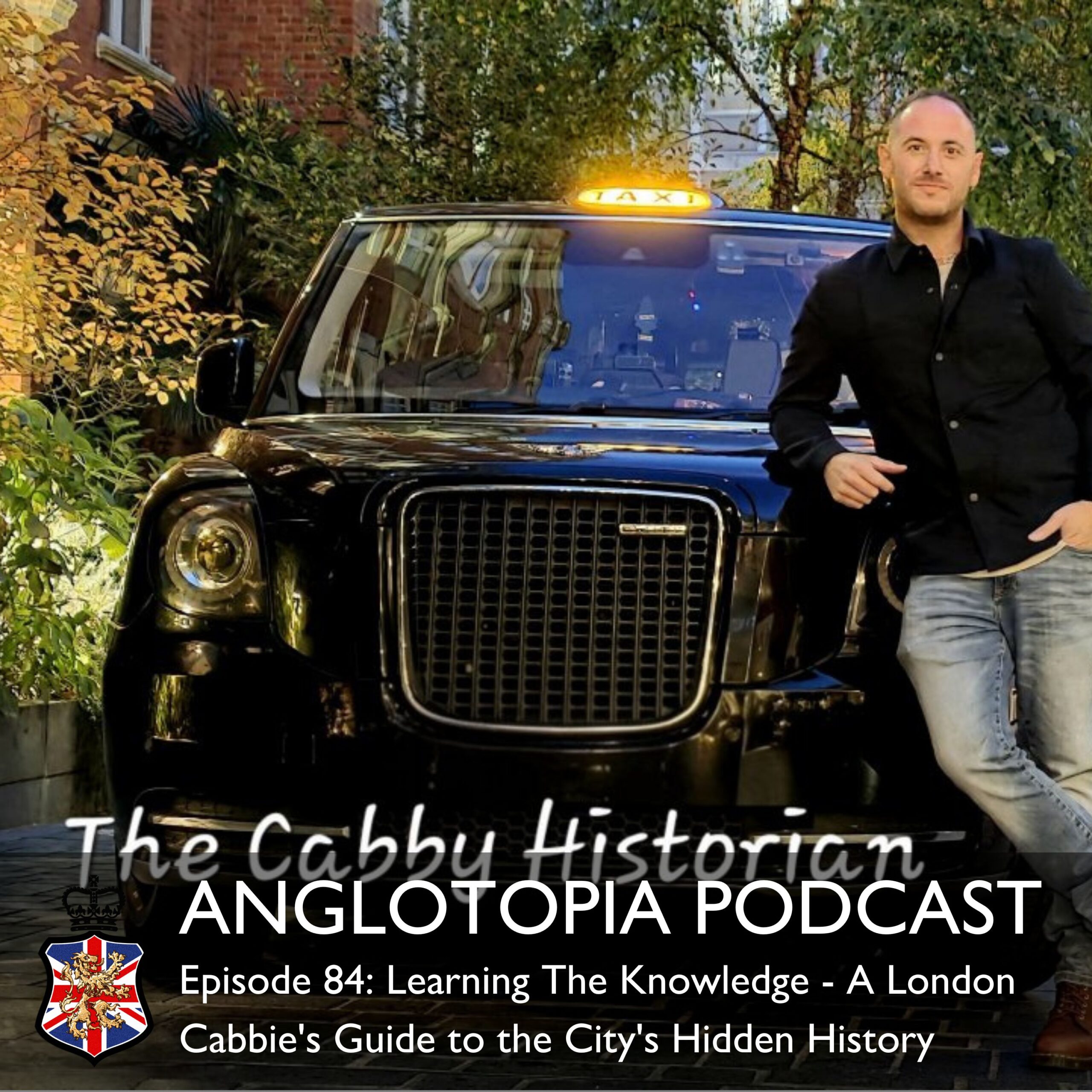





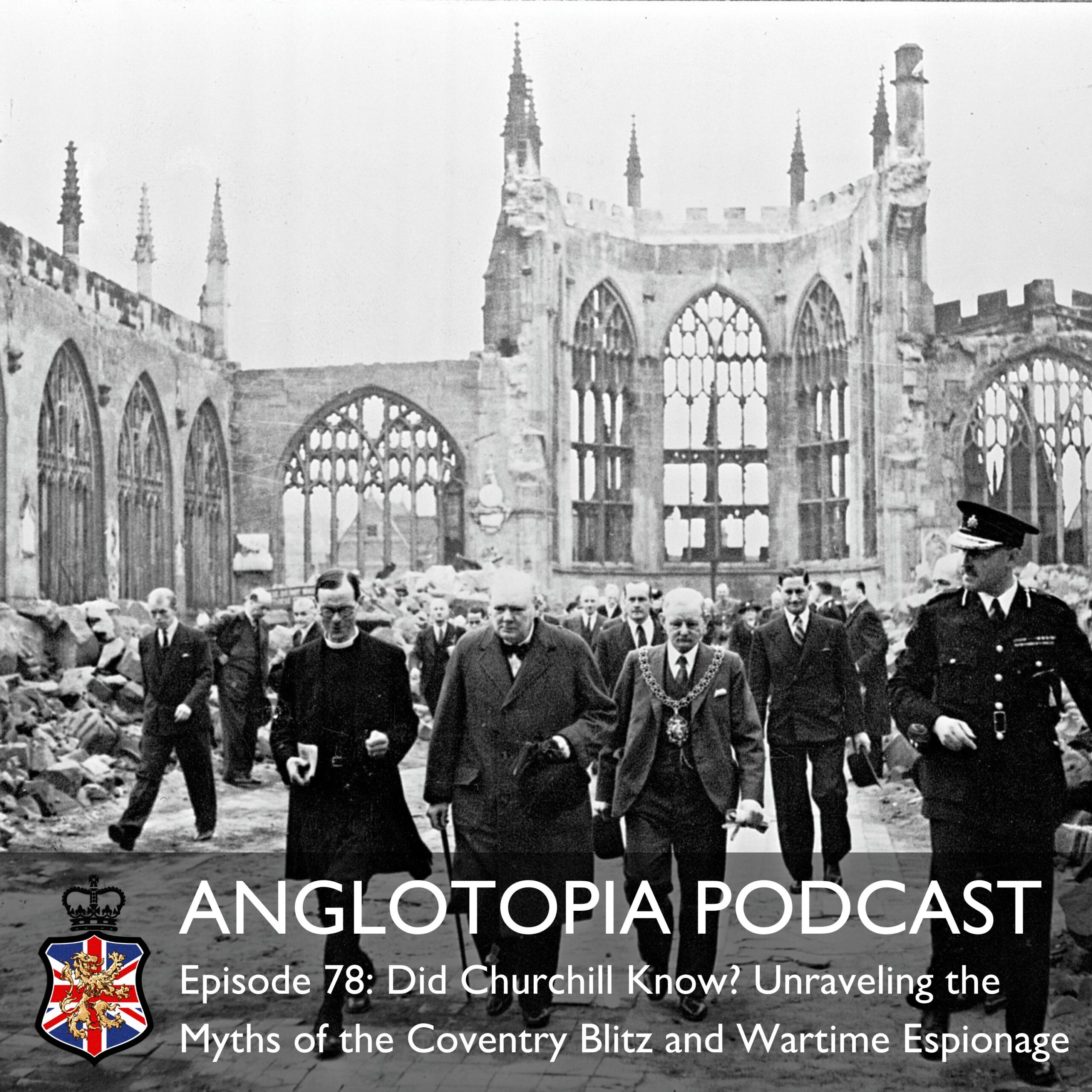
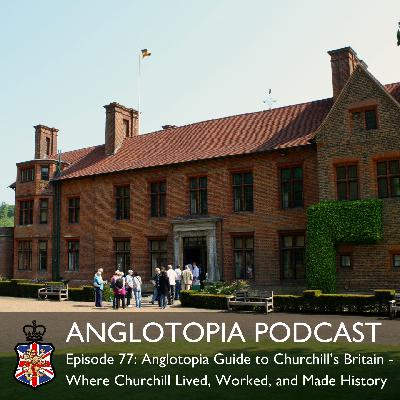
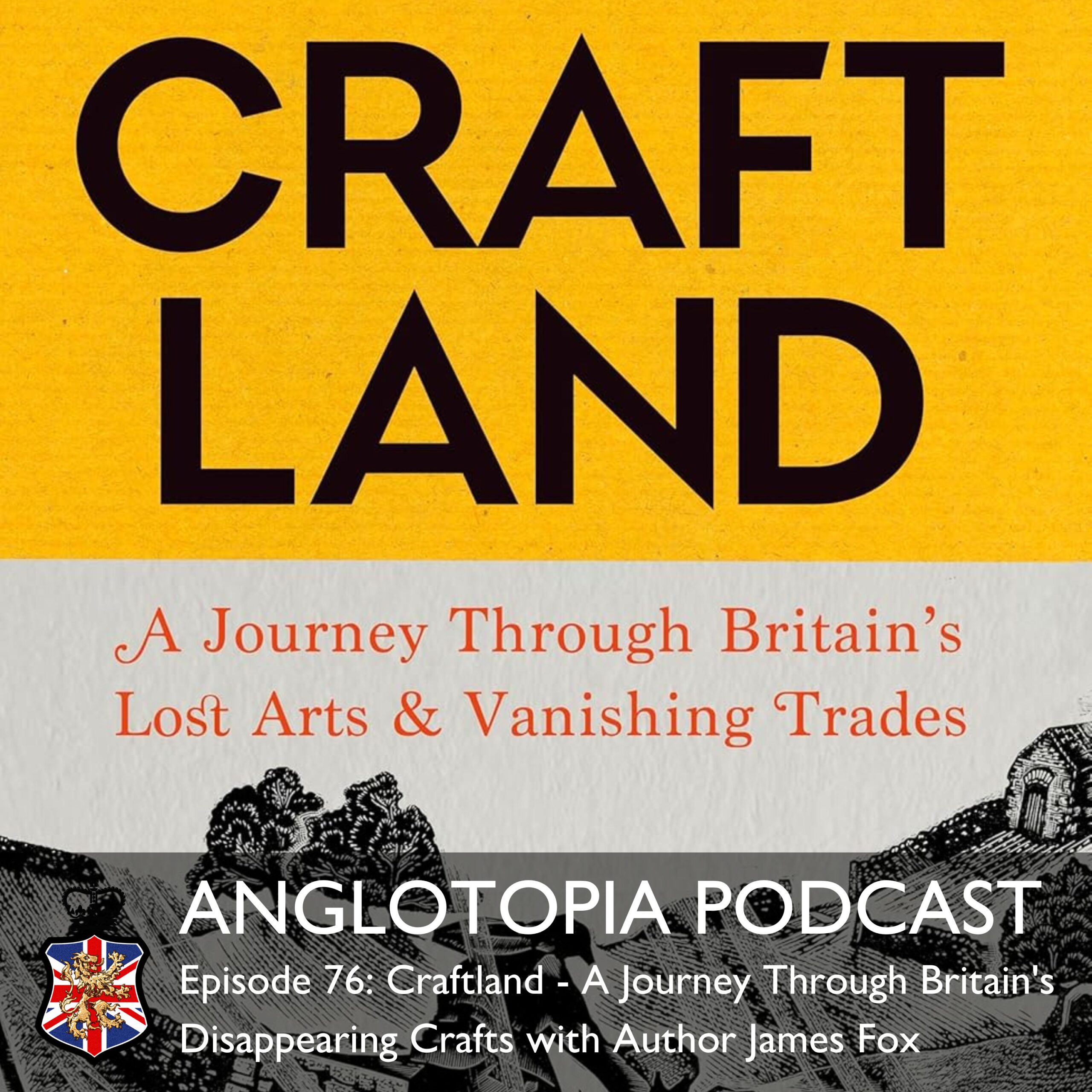
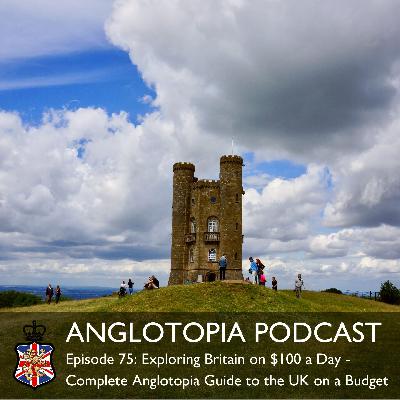
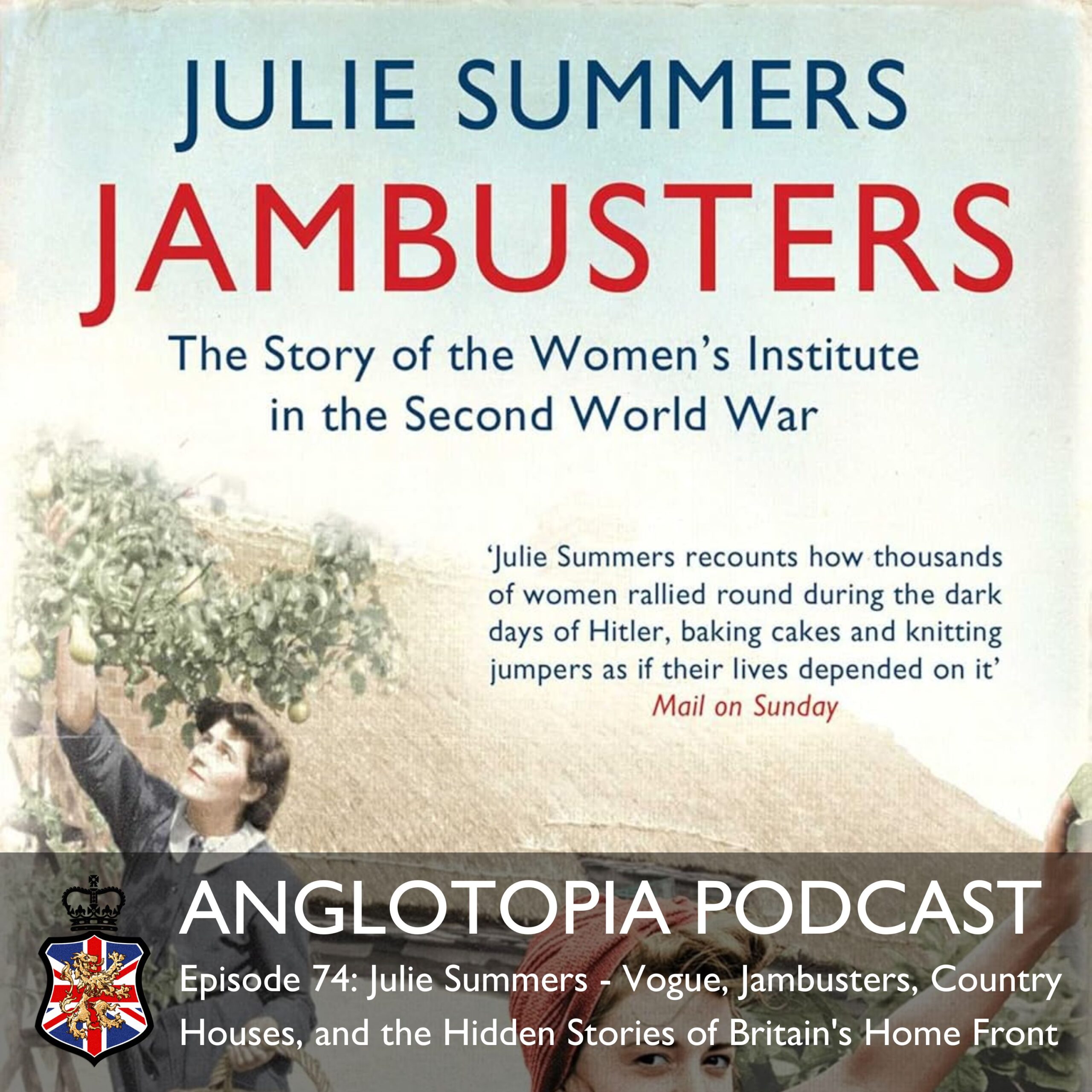
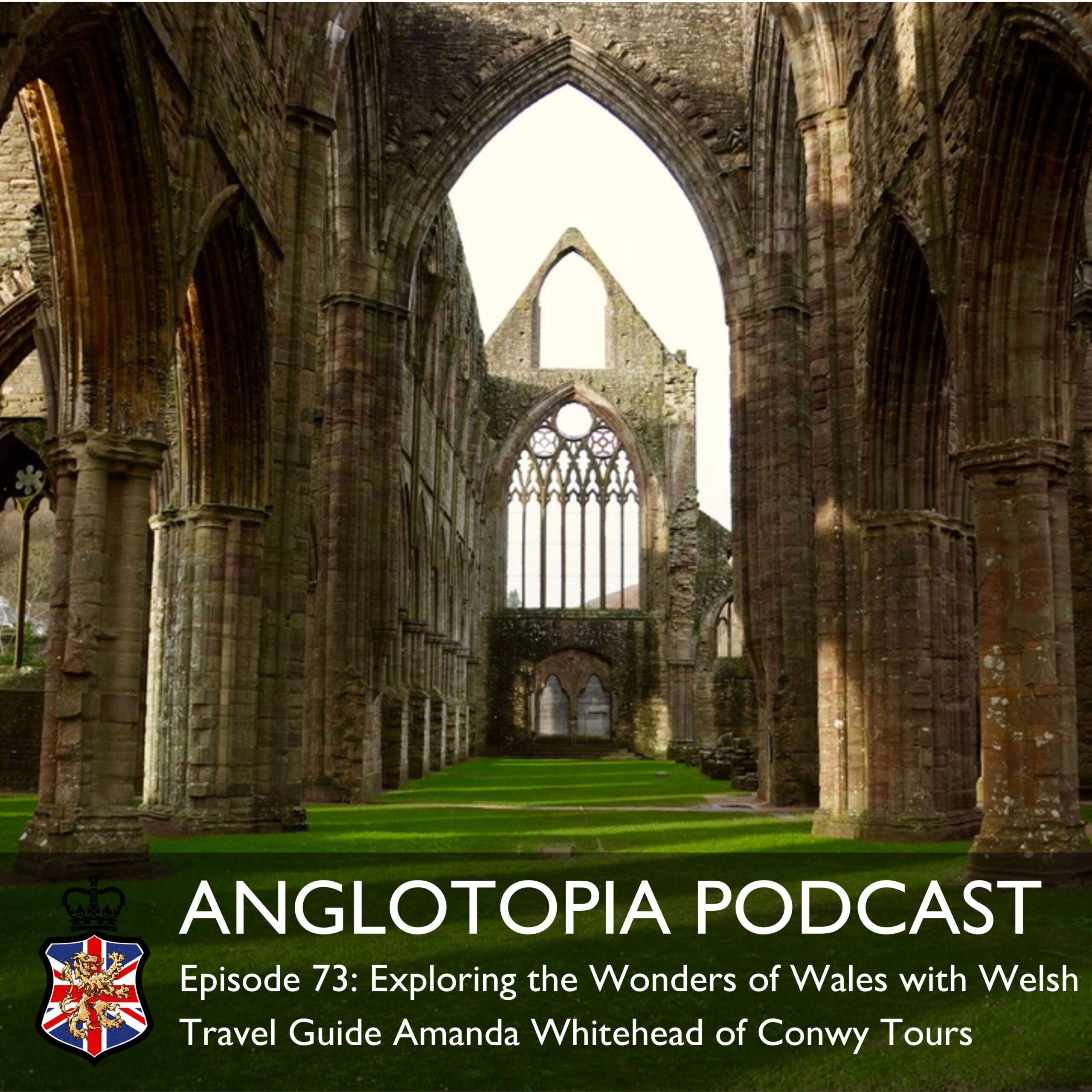
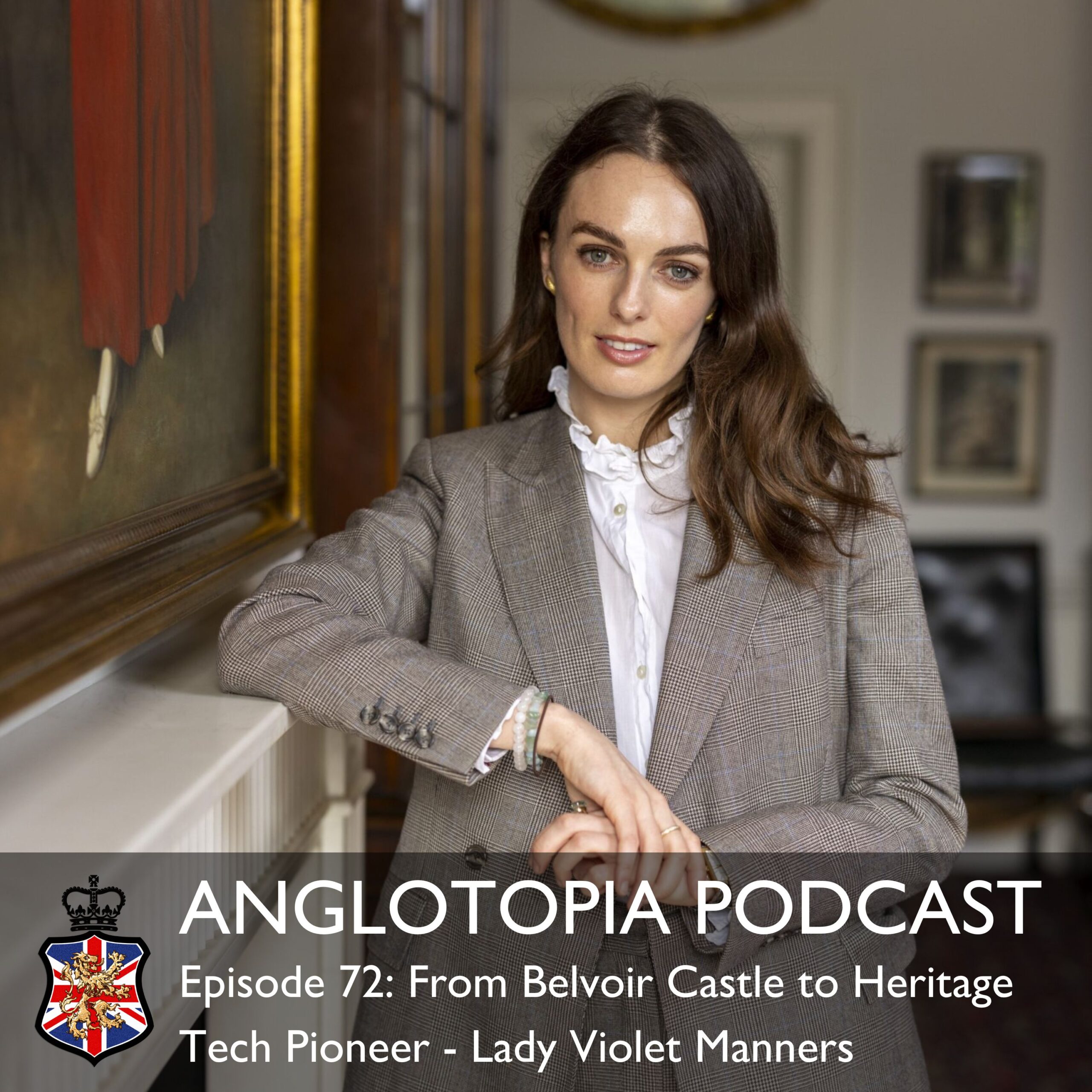
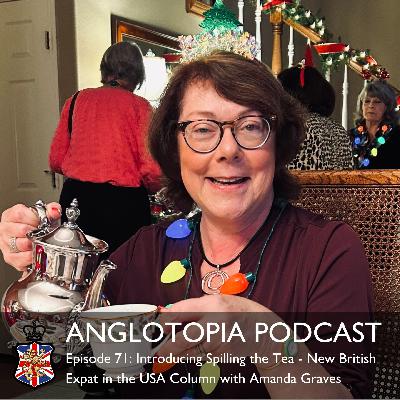
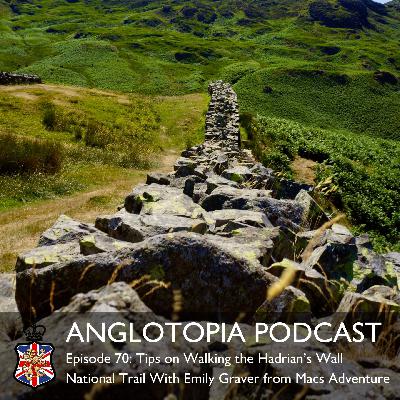
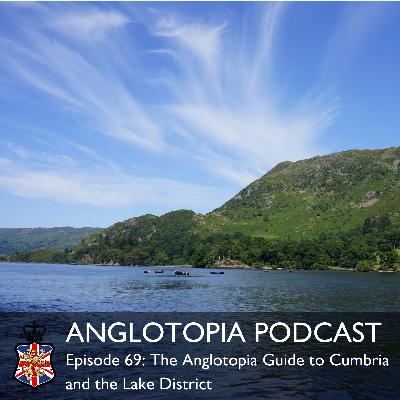
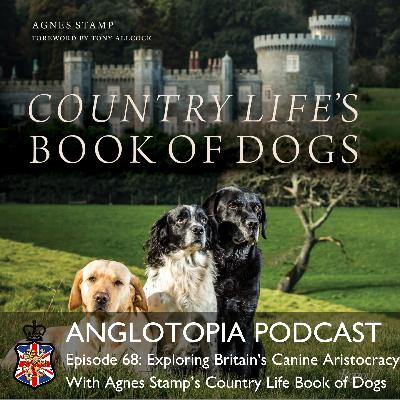
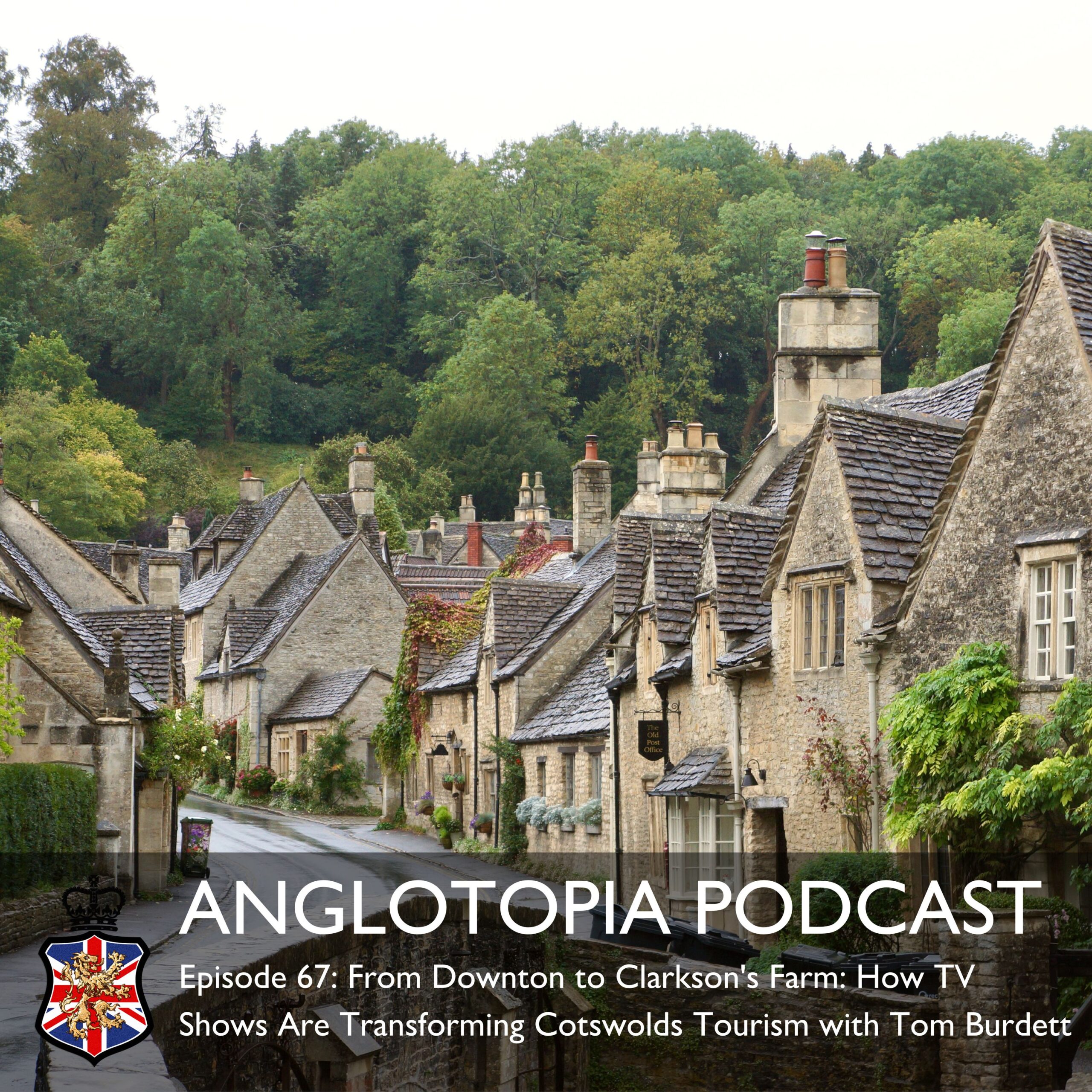
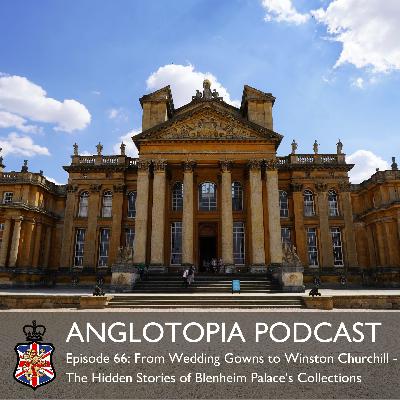




So happy to see this podcast on here, I used to look on the Anglotopia website years ago! Looking forward to listening :) love from England xx